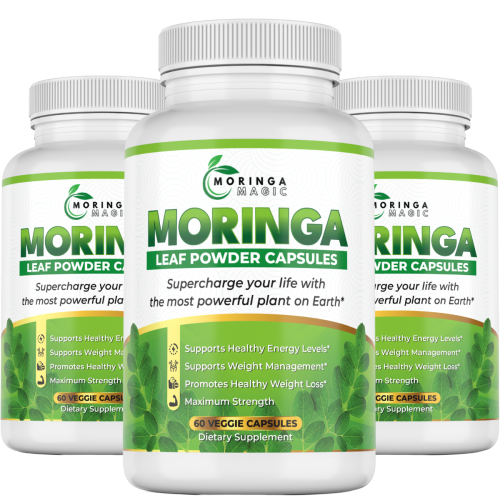Description
The Remarkable Benefits of Moringa: A Comprehensive Guide
Introduction
Moringa oleifera, often dubbed the “miracle tree” or “drumstick tree,” has been revered for centuries across Africa, Asia, and Latin America for its extraordinary nutritional and medicinal properties. Every part of this fast-growing, drought-resistant plant—leaves, seeds, pods, roots, and flowers—is edible or usable in traditional remedies. From ancient Ayurvedic practices to modern superfood trends, Moringa’s reputation as a powerhouse of health benefits continues to grow. Let’s explore why this humble plant has captured global attention.
Nutritional Profile: A Treasure Trove of Nutrients
Moringa’s acclaim begins with its dense nutritional composition. The leaves alone are a rich source of:
Vitamins: High in vitamin C (boosting immunity), vitamin A (supporting vision and skin health), and vitamin E (a potent antioxidant). They also contain B vitamins like B6 and riboflavin, essential for energy metabolism.
Minerals: Calcium for bone health, iron for blood health, potassium for heart function, and magnesium for muscle and nerve health.
Antioxidants: Quercetin (anti-inflammatory) and chlorogenic acid (blood sugar regulation) combat oxidative stress.
Protein: Contains all nine essential amino acids, making it a rare complete plant-based protein.
Fiber: Promotes digestive health and satiety.
Comparatively, gram-for-gram, Moringa leaves outshine common foods: they offer more vitamin C than oranges, more calcium than milk, and more iron than spinach. This nutrient density makes it invaluable in combating malnutrition in resource-limited regions.
Health Benefits of Moringa
Moringa’s high vitamin C content stimulates white blood cell production, fortifying the body’s defense against infections. Antioxidants like beta-carotene and quercetin neutralize free radicals, reducing oxidative stress linked to chronic illnesses. Moringa is a natural immune booster in regions with limited healthcare access.
- Heart Health Guardian
Studies suggest Moringa may lower LDL (“bad”) cholesterol and triglycerides while increasing HDL (“good”) cholesterol, thanks to bioactive compounds like beta-sitosterol. Its potassium content helps regulate blood pressure by counteracting sodium’s effects. Animal studies show promising results, though human trials are ongoing.
- Anti-Inflammatory Powerhouse
Chronic inflammation underpins diseases like arthritis and heart disease. Moringa’s isothiocyanates and flavonoids reduce inflammatory markers. Traditional medicine has long used Moringa to alleviate joint pain and swelling, with modern research validating its anti-inflammatory potential.
- Blood Sugar Regulation
For those managing diabetes, Moringa’s chlorogenic acid may slow glucose absorption, improving insulin sensitivity. A 2020 study in Nutrients found Moringa supplementation reduced fasting blood sugar levels in prediabetic patients, highlighting its role as a complementary therapy.
- Digestive Health Enhancer
The leaves’ fiber content aids digestion, preventing constipation and promoting gut health. Moringa’s antimicrobial properties may also combat harmful gut bacteria, fostering a balanced microbiome.
- Radiant Skin and Hair
Moringa oil, rich in vitamin E and fatty acids, moisturizes skin and strengthens hair. Its antibacterial properties help treat acne, while antioxidants combat signs of aging. When consumed, zinc and vitamin A promote collagen production and scalp health.
Low in calories but high in nutrients, Moringa helps curb cravings and provides sustained energy. Its ability to enhance fat breakdown, observed in animal studies, makes it a popular addition to weight-loss diets.
- Brain Health Protector
Antioxidants in Moringa, such as vitamins E and C, protect neurons from oxidative damage. Emerging research suggests it may enhance cognitive function and mood by regulating neurotransmitters like serotonin and dopamine.
- Energy and Endurance Booster
Rich in iron and B vitamins, Moringa combats fatigue and anemia. Athletes use it to improve stamina, as its nutrient profile supports efficient energy conversion from food.
- Detoxification Support
Moringa’s antioxidants aid liver function, the body’s primary detox organ. Studies indicate it may protect against toxin-induced liver damage, enhancing the organ’s ability to filter waste. 11. Potential Anti-Cancer Properties
Lab studies reveal that Moringa extracts, like niazimicin, may inhibit cancer cell growth. While promising, these findings are preliminary, and human trials are needed to confirm efficacy.
Practical Uses: Incorporating Moringa into Your Diet
Moringa’s versatility makes it easy to enjoy:
Powder: Stir into smoothies, soups, or oatmeal.
Tea: Steep dried leaves for a nutrient-rich brew.
Fresh Leaves: Add to salads or sauté as a spinach substitute.
Oil: Use topically for skin or hair care.
Capsules: A convenient option for daily supplementation.
Start with small doses (1–2 teaspoons of powder daily) to avoid digestive discomfort and consult a healthcare provider, especially if pregnant or on medication.
Potential Side Effects and Precautions
While generally safe, excessive intake may cause nausea or diarrhea. Moringa’s roots and bark, high in alkaloids, should be consumed sparingly. Those on blood thinners or diabetes medications should seek medical advice due to potential interactions.
Conclusion
Moringa oleifera stands as a testament to nature’s ingenuity, offering a sustainable solution to malnutrition and chronic disease. Its nutrient-rich profile, coupled with centuries of traditional use and growing scientific validation, positions it as a vital ally for holistic health. Whether you’re sipping Moringa tea or sprinkling its powder into meals, this “tree of life” invites you to harness its benefits—responsibly and mindfully. As research evolves, Moringa’s role in global health and nutrition is poised to expand, reminding us that sometimes, the best remedies grow right outside our doors.


Reviews
There are no reviews yet.